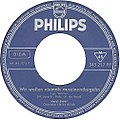We never want to part
We never want to part is the title of a slow waltz composed in 1959 by Michael Jary for Heidi Brühl . Bruno Balz wrote the text together with Gloria de Vos - the former wife and assistant of the magician Kalanag . As a record recording, the title became a number one hit in Germany .
history
In 1959, the Hessischer Rundfunk offered the composer Michael Jary a contribution to the preliminary round of the Grand Prix d'Eurovision de la Chanson 1960 . Jary teamed up with the copywriter Bruno Balz, with whom he had worked successfully since 1938. Balz wrote the text for Jary's slow waltz with the headline “We never want to go apart”. Courtship favored Zarah Leander as a singer, as she had already helped many Jary and Balz titles to success in the past (Can love be a sin; I know a miracle will happen one day) . Jary, on the other hand, tended towards a younger singer, as he hoped for more success from her audience, and suggested the only 17-year-old Heidi Brühl. The dispute finally settled the jury of the preliminary decision, which decided in favor of Heidi Brühl.
The German preliminary decision for the Grand Prix took place on February 6, 1960 in Wiesbaden's Rhein-Main-Halle . There were ten applicants to choose from, and Heidi Brühl was the favorite. Surprisingly, after the jury's decision, Wyn Hoop won with his entry Bonne nuit, ma chérie , while Heidi Brühl had to be content with second place. At the Grand Prix in London, Hoop finished fourth.
A record release of the title We never want to go apart with Heidi Brühl initially failed due to the dispute between the German Philips , with which Heidi Brühl was under contract, and GEMA . The contracts were not negotiated until March 1960 and producer Ernst Verch was able to start producing a single entitled We never want to go apart and Mister Love . The record with catalog number 345 217 went on sale at the end of March, and the title We want never to go apart was already listed in the top 50 by the music journal Musikmarkt on April 9, 1960 . On May 14th, he was first in first place, where he asserted himself seven times. Among the hits of the year after Günter Ehnert's hit record (see literature), the Heidi Brühl song came in fifth place. The record industry awarded the single a gold record due to its sales success . We never want to go apart sold over a million times in Germany alone. In the Dutch charts, Heidi Brühl came fifth with the original version.
The line of text "We never want to go apart" became a catchphrase in Germany .
Cover versions
Due to the initial difficulties at Philips, the first single with the title We never want to go apart came out at Telefunken with Angelina Monti . From the big German record labels, Polydor with Gerd Morell and Ariola with Macky Kasper also tried their hand at the successful title, but none of the cover versions found any interest. The US-American record company Epic Records brought out a promotional single with Heidi Brühl in December 1960 , on which she sang her successful title in the English-German version Ring of Gold Forever More . Ring of Gold was released by Philips in the UK in January . A single was released in Finland in which the Finnish version En lähde pois was sung by local performer Ritva Simuna . Vivi Bach sang an unpublished version in 1960 in the music film We never want to go apart .
Singles discography
- Heidi Brühl, Germany, Philips 345 217
- Heidi Brühl, USA, Ring of Gold Forever More / I always want to be yours , Epic 5-9433
- 'Heidi Bruhl', UK, Ring of Gold / I'll Belong to You Forever , Philips PB.1095
- Gerda Haagen , Germany, great 19
- Macky Kasper, Germany, Ariola 35837
- Angelina Monti, Germany, Telefunken 55288
- Gerd Morell, Germany, Polydor 24264
- Mady Riehl , Germany, Bella-Musica 269
- Ritva Simuna, Finland, En lähde pois , Triola
literature
- Ingo Grabowsky / Martin Lücke: The 100 hits of the century. European Publishing House 2008, ISBN 978-3-434-50619-5 .
- Günter Ehnert (Ed.): Hit balance sheet German chart singles 1956–1980. Taurus Press 1987, ISBN 3-922542-24-7 .
Web links
- The hit from the pulpit. At: swr.de.
- Cover versions. At: coverinfo.de.
- We never want to go apart at Discogs (English)
Individual evidence
- ↑ Lyrics
- ^ Günter Ehnert: Hit balance sheet - German chart singles 1956-1980 . 1st edition. Verlag popular music-literature, Norderstedt 2000, ISBN 3-922542-24-7 , p. 443 .
- Jump up ↑ Joseph Murrells: The Book of Golden Discs: The Records That Sold a Million . 2nd Edition. Limp Edition, London 1978, ISBN 0-214-20512-6 , pp. 122 .
- ↑ Heidi Brühl - Ring Of Gold Forever More at Discogs
- ↑ Heidi Brühl - Ring Of Gold at Discogs


